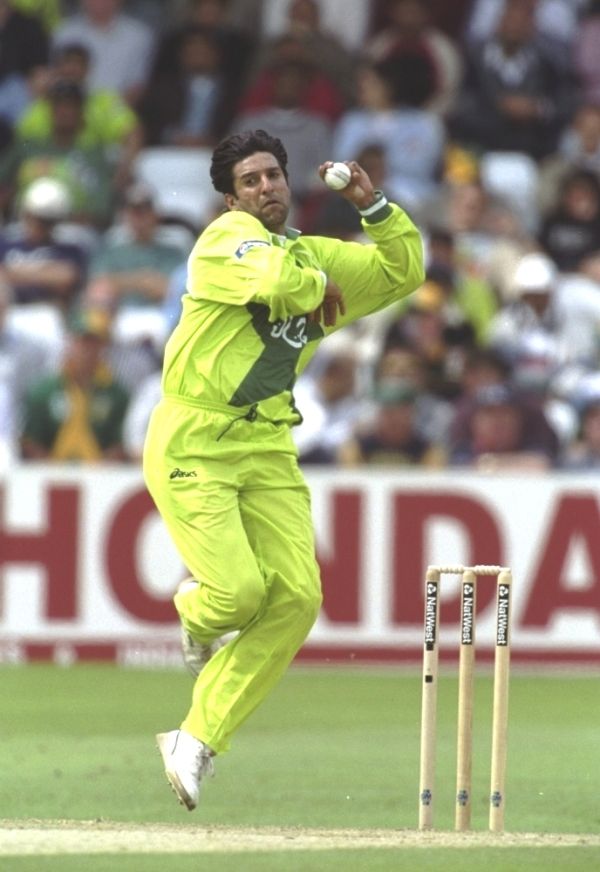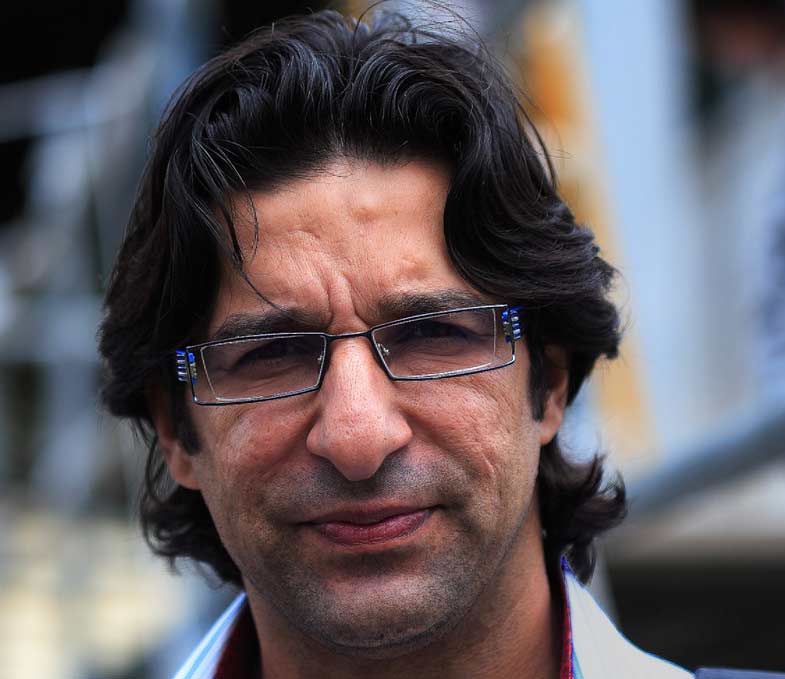Could the passage of time truly diminish the legend of Wasim Akram? The answer, unequivocally, is no. His accomplishments, his influence, and the sheer artistry he brought to the game of cricket remain as vibrant and compelling as ever, regardless of the number of years that have passed since he first graced the pitch.
The very mention of the name "Wasim Akram" conjures images of a left-arm fast bowler at the peak of his powers: a lithe figure with an uncanny ability to swing the ball both ways at searing pace. It evokes memories of wickets tumbling, batsmen bewildered, and the roar of the crowd as another delivery found its mark. He was a maestro of his craft, a revolutionary who redefined the art of fast bowling, and a figure whose impact on the game continues to resonate today. His journey, a story woven with dedication, skill, and an unwavering passion for cricket, is a testament to what can be achieved through relentless pursuit of excellence.
| Attribute | Details |
|---|---|
| Full Name | Wasim Akram |
| Born | June 3, 1966, Lahore, Pakistan |
| Age (as of October 26, 2023) | 57 years old |
| Nickname | "Sultan of Swing" |
| Height | 6 ft 3 in (1.91 m) |
| Playing Role | Bowler (Left-arm fast-medium) / All-rounder |
| Batting Style | Left-handed |
| Bowling Style | Left-arm fast-medium |
| Test Debut | vs New Zealand, Lahore, 1985 |
| ODI Debut | vs New Zealand, Faisalabad, 1984 |
| Teams | Pakistan, Karachi, Lancashire, Northamptonshire |
| Major Achievements |
|
| Retirement | 2003 (International Cricket) |
| Marital Status | Married (Huma Akram, deceased; Shaneira Akram) |
| Children | Two sons (from first marriage) and one daughter (from second marriage) |
| Coaching Career | Coached and mentored various teams, including Karachi Kings in the Pakistan Super League, and served as a bowling coach for several teams. |
| Reference | ESPNcricinfo - Wasim Akram |
The story of Wasim Akram begins, as so many great cricketing tales do, on the vibrant streets of Lahore. Born in 1966, his introduction to the game was initially casual, a pastime enjoyed amidst the bustling city life. However, a serendipitous discovery by the legendary Imran Khan, then captain of the Pakistan national team, altered the course of his life. Khan recognized the raw talent and potential in the young Akram, ushering him into the world of professional cricket. This pivotal moment would set in motion a career that would redefine fast bowling and etch his name in cricketing folklore.
His international debut in 1984 marked the beginning of a reign that would span nearly two decades. From his early days, Akram's ability to swing the ball late, both into and away from the right-handed batsmen, was evident. He possessed a natural athleticism that allowed him to generate incredible pace and bounce off the pitch. His run-up was a graceful, fluid movement, culminating in a delivery that often left batsmen in disarray. He wasn't just about pace; he was a master of deception, varying his line and length, mixing up his deliveries, and setting up batsmen with calculated precision. His left-arm angle provided an additional challenge, making the ball's movement that much more difficult to read. He could bowl effective yorkers, unplayable bouncers, and deceptive slower balls, making him a complete bowler.
The 1992 Cricket World Cup in Australia and New Zealand stands as a defining moment in Akram's career and in the history of Pakistani cricket. Pakistan, a team that had faced its share of struggles in the tournament, arrived as underdogs. However, under the leadership of Imran Khan, and with Akram as a key member of the bowling attack, they defied expectations. Akrams performance in the final against England, a match that Pakistan won, was nothing short of legendary. His devastating spell, which included the crucial wickets of Allan Lamb and Chris Lewis, turned the tide of the game and secured the World Cup trophy for Pakistan. It was a performance that showcased not only his skill but also his temperament, his ability to perform under pressure and deliver when it mattered most. The image of Akram celebrating that victory, arms raised in triumph, is etched in the memory of every Pakistani cricket fan.
Akram's dominance extended beyond the World Cup victory. He became a mainstay in both Test and One Day International (ODI) cricket. His statistics are a testament to his enduring excellence. In ODIs, he is the second-highest wicket-taker of all time, with a staggering 502 wickets to his name. His ability to take wickets at crucial moments, to stem the flow of runs, and to bowl match-winning spells made him invaluable. In Test cricket, he amassed 414 wickets, showcasing his consistency and ability to perform at the highest level over an extended period. He holds the unique distinction of taking a hat-trick in both Test and ODI cricket, an achievement that speaks volumes about his skill and mental fortitude. His career was not without challenges. He faced periods of injury and scrutiny, yet he always found a way to come back stronger, his passion for the game undiminished.
Beyond the numbers, Wasim Akram's influence extended far beyond the cricket pitch. He became a role model for aspiring cricketers, particularly in Pakistan and across the cricketing world. His dedication to fitness, his unwavering commitment to excellence, and his sportsmanship made him an icon. He was a fierce competitor, but he also displayed respect for his opponents and a genuine love for the game. He represented the spirit of Pakistan, embodying the nation's pride and passion for cricket. He was a captivating personality, a natural entertainer, and a master of the art of fast bowling.
His influence continues to be felt today. After retiring from international cricket in 2003, Akram transitioned into a coaching and mentoring role. He has worked with various teams, including the Karachi Kings in the Pakistan Super League, and served as a bowling coach for several international teams. He generously shares his knowledge and expertise with younger players, helping them to hone their skills and develop their potential. His insights into the art of fast bowling, his understanding of the mental aspects of the game, and his experience at the highest level make him an invaluable asset. He remains a prominent figure in the cricket world, providing expert commentary, analyzing the game, and continuing to inspire the next generation of cricketers.
The "Sultan of Swing," as he was affectionately known, is a legend whose achievements continue to resonate. The echoes of his deliveries, the memories of his spectacular spells, and the impact he made on the game remain undiminished by time. His legacy is secure, a testament to a career built on skill, dedication, and a deep love for cricket. His age, while a marker of the passage of time, is irrelevant when considering the magnitude of his contribution to the sport. Wasim Akram's name will forever be synonymous with excellence in cricket, a reminder of the artistry and skill that can be achieved with unwavering dedication and a passion for the game.
The evolution of cricket, the introduction of new techniques, and the changing dynamics of the sport have not diminished Akrams status. His name is still invoked, not just in Pakistan, but in cricket-playing nations across the globe. His ability to swing the ball, his pace, and his skill remain benchmarks. The manner in which he mastered the art of reverse swing, a relatively new concept during his playing days, further enhanced his reputation. His influence is seen in the way many modern fast bowlers attempt to emulate his techniques. His impact extended beyond the field, influencing sports culture, and inspiring future generations of cricketers. It is a testament to the man's character that, even after retirement, he continues to be admired and respected.
Furthermore, his life beyond cricket serves as an example of how to handle the challenges of life. Hes faced personal tragedies with grace and has managed to maintain a positive outlook on life. His strength of character is evident in his ability to continue contributing to the sport and inspiring others, despite the many trials and tribulations life can bring. His influence extends to his role as a commentator, analyst, and mentor. He continues to enlighten and educate cricket enthusiasts and fans around the world, preserving his legacy and promoting the game he loves so much.
Wasim Akram's career is not just a collection of statistics; it's a story of dedication, skill, and perseverance. He is an icon, an inspiration, and a legend whose impact on cricket continues to be felt. From the streets of Lahore to the world stage, he has left an indelible mark on the game. Even as time marches on, his name continues to be spoken with respect and admiration, and his accomplishments remain a benchmark for aspiring cricketers. The "Sultan of Swing" will continue to inspire for generations to come.
The current landscape of cricket, with its emphasis on power hitting and fast scoring, makes Akrams achievements even more remarkable. In a world where the dynamics of the game are constantly shifting, the ability to control the ball, to swing it, and to outsmart batsmen remains a timeless art, and Wasim Akram was one of its greatest practitioners. His career is a reminder that skill and strategy, when combined with dedication and passion, can achieve lasting success. It showcases that the human spirit can overcome any obstacle, and that the pursuit of excellence is a journey worth undertaking. He is, and will always remain, a cricketing giant, a beacon for the sport, and a hero for millions.


